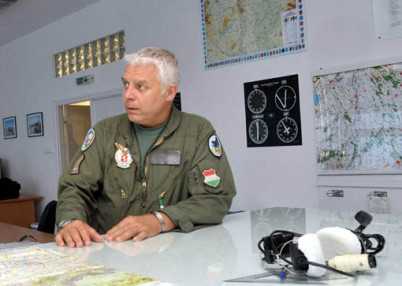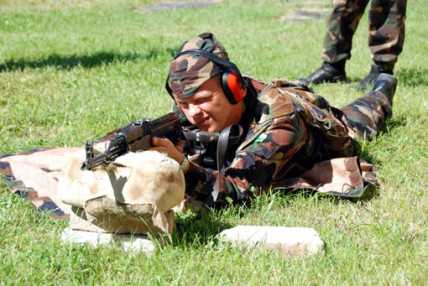The Pilot And The Pilot-Egg
Szöveg: László Szűcs | 2008. október 24. 9:58Chip off the old block. A good example of this saying is Brigadier General István Petõ, Commander of the Kecskemét Air Base, and his child, who has applied to the Canadian pilot training programme – that is the NFTC programme – of the Hungarian Defence Forces.
There are only a few soldiers who do not know Brigadier General István Petõ, the commander of the Kecskemét-based HDF 59th ‘Dezsõ Szentgyörgyi’ Air Base. With nearly 34 years of service and 2,900 flight hours behind his back, he is one of the most experienced fighter pilots of the Hungarian Defence Forces. To this day, he often flies MiG-29 fighter planes and L-39 Albatros training aircraft. But only a few people know that his son, who is in his mid-20s, has decided to follow his father’s example, and he is to became a fighter pilot as well.
I am meeting the father and the son in Szolnok, in the building of the Jak-52 training company of HDF 86th Szolnok Helicopter Base. It is not by accident that we are meeting here, for Brig.Gen. István Petõ is a frequent visitor at the company: he is one of the pilots of the Hungarian Defence Forces who is not only eligible to teach flying Jaks, but he can test the instructors as well, or as he puts it, he is entitled to perform checks. What is more, he even has the civilian licence for this type. The general has landed a propeller-driven training aircraft with camouflage painting only a few minutes ago – he was testing an instructor.
His son, contracted private István Petõ is getting prepared for the dream of his life, to become a fighter pilot, at the Szolnok air base. Currently he is in phase one of the Hungarian stage of the NFTC programme, meaning that he is learning the basics of aviation and the theory.
The first question of the conversation arises automatically: what did the general say upon learning that his son wants to follow his career in the military?

"In that moment have I truly realized what my parents could have thought of me, when a few decades ago I stood in front of them and told them: instead of a veterinary career, I am choosing the military and I will become a fighter pilot. Until that day, everyone believed I would be a vet, or as I used to say, this was the path for me to follow. In secondary school, and even after graudation, I entered national competitions which would have opened the road for me to the university of veterinary science almost automatically. But I changed my mind. It was interesting, and I remember it until this day, that my parents did not say a word when they learned about my decision. I could see in their faces that they were not pleased with my decision, but they did not try to talk me out of it either" – says the brigadier general, who could not accept the decision of his own son without commenting it. But he did not want to dissuade his child either, for he remembers his own example.
Of course, his wife did everything to keep her ’little son’ on the ground. It did not work: following a successful aptitude test carried out by flight surgeons, the younger István – or Pityesz, as his father calls him – has enrolled the NFTC programme. But he did not want to be pilot right from the start either.
"After graduating from secondary school, we had several discussions with dad about where to go next? We have touched on professional military service as well, but at that time, there was no pilot training in Hungary. And to tell you the truth, I wasn’t attracted by a career in the military, only flying. Therefore I decided to have an absolutely civil profession, and besides that, I was going to fly as well. That is why I applied to the transportation engineering faculty of the technical university, and I earned my diploma in aeronautical engineering. After graduation, I started flying and got my licence for motorized gliders. That was when I realized that military aviation has much more to offer, so I applied to the NFTC programme, which has been launched in the meantime" – remembers Pityesz.
The ‘big announcement’ was made to the family when Pityesz passed one of the most difficult stages of the flight aptitude test, the spinal column X-ray. When he was told that the flight surgeons didn’t find any irregularities – which would make him ineligible to fly –, he told his parents about his plan.
"I couldn’t postpone the announcement any longer, since in Kecskemét, dad will sooner or later learn about everything that is related to military aviation. And my mother works in the hospital where the medical examinations are carried out. She is the one who takes the blood of the candidates for the laboratory examinations" – smiles István Petõ Jr.
In the beginning, his father did not understand his son’s decision, since with a diploma in transportation engineering behind his back, he won a state scholarship and continued his studies in order to earn a PhD degree. But he says: the kid has always brought mature, adult-like decisions, therefore he did not want to interfere with his future at this point either.
“In my PhD studies, I have got as far as the pre-degree certificate with success, which means that I have the necessary publications – one of them is being proof-read right now –, sufficient teaching hours, and the required number of subjects. The only thing I have yet to take is my second language exam, and I can earn my pre-degree certificate as well. So with a bit of luck, I can also get a doctorate in engineering, in addition to my fighter pilot qualification" – says the fighter pilot candidate.
Of course, he is aware of the fact that the profession he has chosen is not just a simple occupation. It may be dangerous from time to time, just like his father has experienced more than one dangerous situations in the past three and a half decades.
"During my career, I have been in situations more than once when I said: ’oops, I’m so glad I made it, it wasn’t up to me!’. There was one occasion when I even had to eject, it happened when I was serving in Pápa, and the reason was that the engine of my aircraft stopped working. There was another case when I was on a maiden flight and my engine stopped again, but luckily enough, I managed to re-ignite it. During the nearly 3,000 hours spent in the air, there have been a few cases which – if I recall them – do not make me happy knowing that my son is choosing this career. But if I think of how beautiful this profession is, and how beautiful our career is, I am glad that he, too, will become a pilot. As the saying goes: one eye is crying, the other one is laughing" – says Brig.Gen. István Petõ, who is known by the name Pinyó in professional circles.

It is a tradition among pilots that everyone has a nickname. In western countries, this name is also the call sign of the pilot. In our country this is not customary yet – says the general –, although he once wrote Pinyó in the ’call sign’ column of the flight plan… And why this nickname?
"In the late 80s, there was a humorous contest in Hungary, where the Markos–Nádas duo played investigative journalists, and one of them was called Pinyó. The story was that some bad people robbed a museum, and they solved this case. Well, my mates and I liked this story so much that we were listening to it almost all the time, and eventually learned the lines by heart, quoting it to each other. Somehow it was always me who got the lines of Pinyó, and this is how this nickname stuck to me. To be honest, I already had a similar nickname, which was a version of my family name – I used to be Pinyõ. I tried to fight against that for a while, but if one is not called this name face-to-face, then he will be called the same behind his back. Therefore I thought, all right, I will be Pinyó" – the general recalls the old memories.
“For many, I’m still ‘Little Pinyó’, but I hope that this name will not stick to me, for I wouldn’t like to be the ‘small duplicate’ of a well-known man. For the time being, I haven’t got a real nickname, what is more, everyone calls me a bit differently in the family. Dad calls me Pityesz, and to mum, I’m Pityu. The majority of my mates simply call me Petõ" – says the younger István, who is often called pilot-egg by his father during our conversation. Of course, this is not a ’personal’ nickname, for trained fighter pilots call everyone who is only getting acquainted with this beautiful profession that is not always without dangers, in their family names.
Curiously enough, the trained pilot and the pilot-egg have never flown together. Naturally, it can happen that in the Hungarian phase of the pilot training course, during the Jak–52 flights the general and his son share a plane, but the provisions clearly prohibit him from testing his son on the check flights.
"It would be appropriate for us not to fly together ever. Reason makes me say that. But the emotions say that I must sit behind him once. To see how he flies, just for the sake of curiosity" – smiles the general, who has a message, a father’s advice to the son: when he is flying, he cannot count on anybody else just himself. Moreover, he must learn everything that is necessary for flying, and he always has to pay enormous respect to the aircraft.
There is only a slight chance though, that father and son will serve in the same corps. For at least 3-4 years will pass until Pityesz becomes a trained fighter pilot. And – as far as we can tell now – his father will not be leading the Kecskemét air base by then.
"I think there is absolutely no need for the service of 56-57 year old ’wheelchaired’ fighter pilots in the military. And by the time my son will return to Kecskemét, following the completion of the Canadian training, I will be near the retirement age. But I believe it will be better for him, too, to get back to the base when I’m not there" – adds Brig.Gen. István Petõ.
Of course, there is a long way to go until then, for the pilot-egg is at the beginning of his training. He joined the army in August, and completed the compulsory 3-week basic training in Szentendre. Then he was sent to Szolnok, where a ’warming-up’ parachute training awaited him. He had to complete 12 jumps in total – 8 fastened jumps, and 4 manually opened ones –, similarly to his 11 mates, with whom he started the preparations. Today he is proudly wearing the parachuter tab on his uniform, and says: perhaps he liked parachuting a bit too much. He would gladly have jumped more.
The theoretical preparation of pilot candidates will end in the middle of November. The training will commence with an intensive English course, and the best students can fly Jak–52s next February. In the summer, the NFTC course will continue in Canada. Pityesz hopes that he will be among the seven young people to go to North America in the summer.